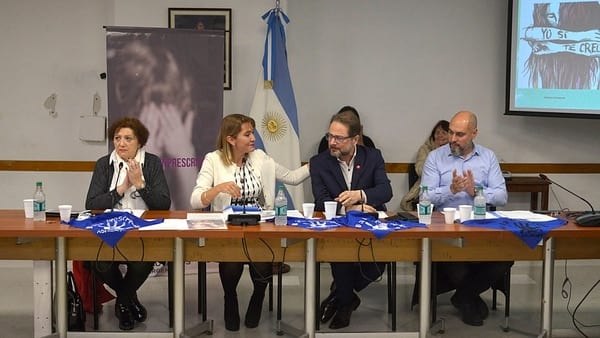An abuse survivor in the pontiff’s native Argentina has called on Pope Francis to back a push in the country’s senate to eliminate a statute of limitations on sexual crimes against children in Argentine law.
The bill was introduced just days after Chile’s congress voted July 6 to remove the statute of limitations on child abuse from its own criminal code. An earlier effort in Argentina to lift the statute of limitations in 2011, known as the “Piazza law” for fashion designer Roberto Piazza who was sexually abused by an older brother, was subject to diverse legal interpretations and, observers say, has not been widely implemented.
Speaking with Crux, survivor Ricardo Benedetti, who says he was abused by a priest when he was 8 years old, and who is today the main force behind the new bill, said it’s important to have the support of his fellow Argentine, the pope.
“It would be a great step [for survivors] if he were to accompany the bill proposal, because there are more than a few senators and deputies who would listen to him,” Benedetti said.
“If he wants to take the matter of providing justice to survivors, and preventing these crimes from ever happening again seriously, he can count me as an ally,” Benedetti said, saying he would like to have the opportunity to have a “frank conversation” with the pontiff.
National Deputy Lorena Matzen, a supporter of the bill, said child abuse can be compared to “crimes against humanity.”
“It’s said to be an exaggeration, but we know that when a child suffers sexual abuse, it can be like being dead while alive,” Matzen said.
According to the legislator, “pain doesn’t have a deadline.” Argentina, she said, needs to be sure such crimes aren’t prosecuted solely due to the passage of time, because victims can only have peace when their abusers are sentenced.
Benedetti recounted the sexual abuse he allegedly suffered when he was a child.
“At 8 years old I was abused by Father Hector Ricardo Giménez, prior to [my First] Communion in the process of confession,” Benedetti said, saying the abuse lasted for two years. “My personal process was to bury [the abuse] in books and television. That was my childhood. Yet, since what doesn’t kill you makes you stronger, here I am.”
Having repressed the memory for decades, Benedetti said that after meeting a group of survivors he decided to go public in late 2018. Since he’s 51, the crimes have passed the statute of limitations according to Argentinian law.
Yet Benedetti noted the priest who allegedly abused him is still alive, living in La Plata, some 25 miles from Buenos Aires.
Benedetti reported the abuser to civil authorities but not to the Church, because Giménez has already been tried under canon law. In 2016, the then-archbishop of La Plata, Hector Aguer, released a statement saying the priest had been investigated, found guilty and a “just” punishment imposed. However, it’s unclear what the punishment was and if it came from a local ecclesiastical tribunal or the Vatican.
In 2014, Julieta Añazco, another alleged victim, went to the Vatican to present a letter to Francis telling him about her case and asking him to tell Aguer to make the archdiocesan investigation public. She heads the organization “Churches without Abuses.”
Under Argentine law, too much time has passed to charge Giménez with a crime, though his accusers did persuade authorities to take a sample of the priest’s blood to add him to a national registry of sexual offenders.
It’s for cases such as this one that the newly proposed bill would be important, Benedetti said Monday.
His experience, he said, hasn’t changed his faith, and today he chooses to send his children to a Catholic high school. But he’s committed to making sure that what happened to him doesn’t happen to his children or anyone else, noting the Church is only one sphere where these crimes happen: “We know that where they happen the most is in the family,” he said.
So far, he’s not been approached by any church officials, but says that through a “personal friend,” he’s had an informal dialogue with the Vatican. But, he insisted, he would like to talk to Francis about his case.
“It touches [the pope] because I’m one of the several people who were victims of clerical sexual abuse in his home country,” Benedetti said. “It touches him because it has to do with what he did, and could have done, as archbishop of Buenos Aires and president of the bishops’ conference.”
Despite the Argentine connection, Benedetti does not blame the pope, nor “do I blame the Church as an institution for the crimes of one man.” However, he “really” wants to know what Francis is doing to prevent these crimes from happening again within the “institution he leads.” He believes Francis is committed, but he also charges the pope has made several wrong moves, including his first reactions in Chile.
“I would like to have a dialogue to try to understand, first-hand, what he’s trying to accomplish, [because] at least in Argentina, particularly outside of the bigger cities, change within the Church on how to address these issues is not evident,” he said.
“Speaking with other survivors, our understanding is that there still are attempts to cover things up,” Benedetti said.

